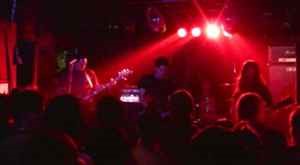I managed to talk to Satoshi Suzuki, former guitarist and vocalist of MUGA.
For me, MUGA was so influential and I personally consider them one of the best crustcore bands ever. They emerged in the early 2000's and released their 1st album in 2002, followed by the tape 'A Road to Asura' in 2004, then another full length LP and a split with Swarrrm. They blew me away instantly with the intensity, brutality, speed, melody and overpowering darkness. The band's story though is a bit mysterious and I could only trace a little info on the internet over the years. And each bit of information contradicts others, so obviously it's just loads of unverified bullshit posted everywhere.
I wanted to clarify the misinformation about the band with Sato, but mostly to hear what he's been up to after MUGA disbanded in 2008, after recording their second, full length album. They never played a gig after that.
1. What have you been up to since you stopped actively playing in bands?
S: I moved to Tokyo in the end of 2012 and played with old friends of mine Voco Protesta for some years. Currently I'm in this not-really-active band Cotgrave with some guys from Voco Protesta, so I haven't totally stopped playing music. Tokyo is a difficult place to play in a band as no one owns a car to carry gear.
I started a publishing company called Gray Window Press in 2018 and published "Debacle Path", a magazine focusing on non-musical aspects of punk, hardcore culture. The magazine featured anarchist punks in Japan in the 1st issue and I interviewed a few cool American punk friends who went into academic fields in the 2nd issue. I also translate and publish some punk-related books by myself.
Check https://graywindowpress.com/ though most of my stuff are in Japanese language.
2. You lived in the US for a while, according to certain sources.. Do you consider your time spent in America as fun and/or productive and did you find it hard to go back to Japan?
S: No, I never lived in the US. I wish I had. I only went there for touring or visiting friends. Yasu Koketsu, the bass player of MUGA lived in the states in 90's so probably you are confused with him. He is a cool guy who influenced me a lot when we were in the band.
3. Are you still involved in the scene?
S: Kind of. As I mentioned previously, because I make books related to punk. But not really sure if punks in Japan are reading my books or not, so not sure either if I could say I am literally involved in it.
4. What does 'punk' and 'subculture' mean to you today?
S: Today punk doesn't mean anything to me anymore. It's been dead for long time. Most of the people in the scene are in their 40s or 50s and I'm one of them. It looks like that the situation is "no more room in hell" in the film Dawn of the Dead. I've been thinking for long time that I should quit and leave so young punks (if there are any) would feel no pressure of the underlying seniority system and become a part of the scene to do something totally new, but unfortunately I'm still trapped in it. Namely, punk today seems to be basically for middle-aged bourgeois men who stick to the tradition of their nostalgy (record collection/purchase in particular. What I am doing with my publishing company could be too), or simply just for hipsters or conformists or wannabe-intellectuals.
On the other hand, I also see punk in some other countries (and probably some small part of Japan too) today as something like a non-material weapon for any kinds of minorities, which I think punk should be again.
5. What was your musical influences when you started as a musician and has it changed a lot by now?
S: I was into metal before punk in my mid-teen and I don't think punk impacted on me musically so much. Punk was more like an exciting zoo where I learned from many interesting people about how to see the world, anarchist way of thinking, how to be independent as well as pleasure of travelling. I still check underground metal but stopped following most of present punk things long ago.
If I mention one punk influence on me, it is definitely Poison Idea. I've never been into any "crust" punk musically and actually MUGA was never a "crust" band, at least we never thought we were "crust" no matter what kind of music we played.









.jpg)


